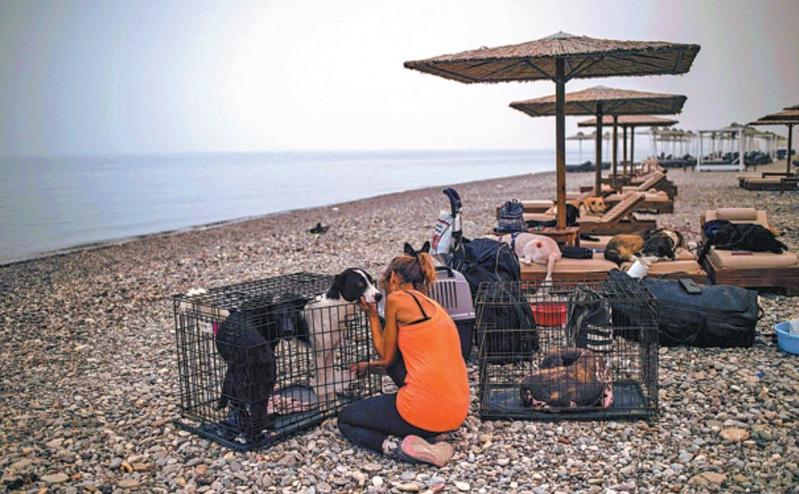Save our future, they tell world after stark warning by UN scientists
 A woman takes care of an injured dog on a beach during a wildfire on the Greek island of Evia on Monday. Extreme heat is driving massive fires in Southern Europe, including Greece and Turkey. (ANGELOS TZORTZINIS / AFP)
A woman takes care of an injured dog on a beach during a wildfire on the Greek island of Evia on Monday. Extreme heat is driving massive fires in Southern Europe, including Greece and Turkey. (ANGELOS TZORTZINIS / AFP)
Dozens of small island states most vulnerable to the effects of climate change have called on the world to save "our very future" after a landmark United Nations report said accelerating global warming and rising sea levels threaten their existence.
The call to action came after the climate report warned that catastrophic global warming is occurring far more quickly than previously forecast, an assessment met with horror and hopefulness by world leaders and green groups.
"We have to turn this around," Diann Black-Layne, lead climate negotiator for the Alliance of Small Island States, or AOSIS, and ambassador of Antigua and Barbuda, said in a statement late on Monday.
"The stark fact is that if we keep warming to 1.5 C we are still facing half a meter of sea level rise. But if we stop warming from reaching 2 C, we can avoid a long-term 3 meters of sea level rise. That is our very future, right there."
The group comprises 39 states including Cuba, Jamaica, Papua New Guinea and the Maldives, the world's lowest-lying country.
It said the report confirmed that governments around the world must take critical action to cap warming to the 1.5 C temperature goal of the 2015 Paris Agreement.
The report by the UN's Intergovernmental Panel on Climate Change, or IPCC, published on Monday, said the world is on course to reach that level around 2030, a decade earlier than predicted just three years ago.
That level of global warming will have devastating impact on humanity, including more extreme weather events such as fires, typhoons, droughts and floods.
In its first major scientific assessment since 2014, the IPCC said that by mid-century, the 1.5 C threshold will have been breached across the board, by a tenth of a degree along the most ambitious pathway, and by nearly a full degree at the opposite extreme.
The 3,000-plus-page report, written by 234 scientists from 66 countries, notes that the damage humans have imposed on the Earth is so severe that it has brought about unprecedented changes.
Massive fires
In Greece, the fire brigade was bracing for a pick-up in winds from Tuesday afternoon which could cause more flare-ups on Evia, Greece's second largest island, where fires were burning for an eighth day.
As blazes burned unabated in many parts of the country for a seventh day, the biggest front was on Evia just off the mainland east of Athens. Smoke and ash from Evia blocked out the sun and turned the sky orange. So far, the fires have killed two people.
UN chief Antonio Guterres said greenhouse gas emissions from fossil fuel burning and deforestation are "choking our planet and putting billions of people at immediate risk" and that countries must "combine forces "to avert catastrophe.
Many world leaders reacted to the report by calling for immediate action to curtail the rise of the world's temperature.
But Scott Morrison, Australia's conservative prime minister, rejected growing calls on Tuesday to adopt more ambitious emissions targets.
"Australia is doing its part," Morrison said. "I won't be signing a blank check on behalf of Australians to targets without plans."
Australia is at the forefront of the global climate crisis, as one of the world's largest fossil fuel exporters and the victim of multiple climate-worsened disasters.
In recent years, the country has suffered intense droughts, the largest bushfires in its recorded history, floods and coastal erosion among other disasters.
Agencies, Liu Yinmeng in Los Angeles and Xinhua contributed to this story.


